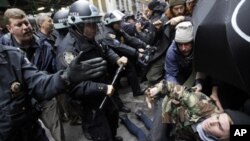Two months after the Occupy protest movement started spreading across the United States, tensions between demonstrators and local authorities are growing.
The First Amendment of the U.S. Constitution states: "Congress shall make no law respecting an establishment of religion, or prohibiting the free exercise thereof; or abridging the freedom of speech, or of the press; or the right of the people peaceably to assemble, and to petition the Government for a redress of grievances."
The First Amendment's protections are so strong that courts have allowed hate speech and even speech that defames people because of their race or religion.
In fact, former U.S. Supreme Court Justice William Douglas once wrote that a function of free speech was to "invite dispute" and could best do that by "[creating] dissatisfaction" and even "[stirring] people to anger."
First Amendment expert and attorney Floyd Abrams says that the Occupy demonstrators are within their rights to protest. But he cautions that the amendment does not necessarily protect the ways they are going about it. "In a situation like this where you're talking about a mass of people taking over a large area of space and basically saying, 'this is now ours, not the rest of the city's, this is now ours to keep and to build and to live in,' I don't think the First Amendment goes there," Abrams said.
Abrams says protesters legally cannot try to shut down businesses, block roads or commandeer city resources to broadcast their message.
He says these limits to free speech fall under time, place and manner restrictions historically used, in fact, to protect the rights of others.
"There are some limits that can be placed on where you speak and how much you speak in a particular area because other people want to speak also or other people want to sleep or do other things," Abrams said.
But what about the journalists who are covering the demonstrations? Can authorities forcibly disperse them with the protesters?
Tom Fiedler, the dean of Boston University's College of Communication and former executive editor of "The Miami Herald" newspaper. says the government must be able to carry out its function in the broader public interest.
"That might include asking reporters to stay out of the way of a police action. But what the government cannot do is then prevent the reporters from informing the citizenry of what the government ordered them to do. And that's how journalists hold government to account," he said.
The First Amendment may prohibit the government from making laws to limit certain freedoms, but legal expert Floyd Abrams says it cannot be considered by itself.
"The First Amendment is not our only law. It is a law and it is a significant limitation, but it doesn't answer every question," he said.
He says its up to the courts to define those rights and determine how to balance them.
Occupy Protests Put Focus on Limits of US Free Speech Rights
- By Sean Maroney




